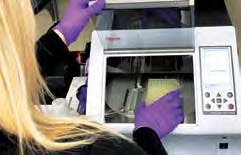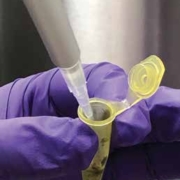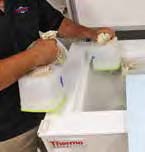TRAPS, TESTING, AND TREATMENTS
Fighting dengue fever in Collier County
by Patrick Linn, MS, MSHAPI
Executive Director, Collier Mosquito Control District
A few months ago, a Collier County resident contracted dengue fever through the bite of a local mosquito. When the Florida Department of Health notified us here at Collier Mosquito Control District of the illness, we immediately implemented our Mosquito Borne Disease Response Plan.
We were prepared; we had monitored the spread of dengue in Cuba for months, where cases began ticking upward in early spring. It was only a matter of time before locally acquired dengue cases began occurring in the Miami-Dade area. Given the mobility of today’s global society, it’s understandable how quickly such a virus can travel.
The Aedes aegypti mosquito species—which is prevalent in tropical and sub-tropical environments—transmits the dengue virus from one person to another. If an Ae. aegypti bites a human who has the virus, the mosquito can then spread the disease to every subsequent person she bites.
Why didn’t the District’s routine activities detect and eliminate the threat before the infection occurred? The answer lies in our name, the Collier Mosquito Control District. Our mission includes reducing nuisance mosquitoes to a tolerable level and mitigating disease risk. The Research team had been trapping mosquitoes each week and testing them for the presence of diseases, and dengue was not detected.

The District’s PCR machine helps scientists determine if disease is present in mosquitoes within hours.
Where was this resident when he/she was bitten? It’s difficult to determine. Maybe a traveler with dengue arrived in our community and was bitten by a mosquito which then bit our resident. Or perhaps an infected mosquito arrived in Collier County inside a vehicle or shipment from the other coast.
Determining the exact location where the resident was bitten wasn’t possible but intensifying the trapping and testing of mosquitoes in our community—as prescribed in our Response Plan—was easily achieved. In this case, the District’s Research team set an increased number of traps to collect mosquitoes, and after a 24-hour period, each trap’s contents were brought into our laboratory and tested for evidence of disease. This process occurred multiple times per week throughout August and September.
In addition to testing and trapping, numerous treatments during those two months were focused on controlling the Ae. aegypti mosquitoes, which are found in highly populated areas. This mosquito—considered an invasive species—prefers to feed on humans and has evolved to live close to its food source. Considered a “container breeder,” the female lays her eggs in open containers of water found around homes and businesses which provides easy access to their favorite meal. Those eggs become flying adults in five to seven days, and the mosquito will travel only a few blocks in its lifetime.
During August and September, the District carried out 13 treatments via trucks targeting Ae. aegypti larvae and nine aerial treatments for the adult mosquitoes in areas including Golden Gate City, East Naples, and both industrial park areas in Naples. The trucks applied a mist of Bti (Bacillus thuringiensis subspecies israelensis), which settles in open containers of water to reduce mosquito larvae numbers. Bti is derived from soil bacteria and has no toxicity to people, pets, plants, and fish.
It is used for pest control in organic farming and is used throughout the United States for mosquito control.
The Environmental Protection Agency cites studies which indicate Bti has minimal toxicity to honeybees. The toxins in Bti specifically affect the larvae of only mosquitoes, black flies, and fungus gnats. These toxins don’t affect other types of insects, including honeybees. At the end of September (the time of this writing), no mosquitoes had tested positive for dengue, and no additional cases of locally acquired dengue fever in Collier County were reported.
Featured Photo: Mosquitoes are sorted by species then tested for disease.
Want to know more about the science behind mosquito control? Looking for someone to speak to your group’s next meeting? Visit the District’s website at cmcd.org or call 239.436.1000.







Leave a Reply
Want to join the discussion?Feel free to contribute!